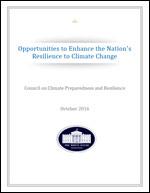 The White House Council on Environmental Quality sponsored a November webinar reviewing the Resilience Opportunities Report, Opportunities to Enhance the Nation’s Resilience to Climate Change, from the Council on Climate Preparedness and Resilience. This report discusses the steps that the Obama administration has taken to address resiliency building initiatives and outlines key opportunities for advancing climate resilience moving forward.
The White House Council on Environmental Quality sponsored a November webinar reviewing the Resilience Opportunities Report, Opportunities to Enhance the Nation’s Resilience to Climate Change, from the Council on Climate Preparedness and Resilience. This report discusses the steps that the Obama administration has taken to address resiliency building initiatives and outlines key opportunities for advancing climate resilience moving forward.
From the Report:
Climate change affects every community and economic sector in the United States. Increasing temperatures, rising sea levels, increases in the intensity and frequency of certain extreme weather events, changing precipitation patterns, and other impacts are affecting people throughout the Nation. Higher temperatures and more frequent and intense heat waves drive up energy costs; raise the risk of heat-related illness; and threaten crops, fisheries, recreation, and the reliability of water and food supplies. Sea level rise threatens coastlines and ports and can fuel higher storm surge.
The interagency Council on Climate Preparedness and Resilience (Resilience Council) was formed to coordinate work on programs across Federal agencies. The Resilience Council has worked with state, local, and tribal leaders, community organizations, academic institutions, philanthropic organizations, and the private sector to advance climate science and support on-the-ground decisions. To build upon and sustain this work, the Resilience Council identified a set of key opportunities using the expertise and experience within Federal agencies and the perspectives of numerous stakeholders. These opportunities will guide sustained and coordinated action among Federal agencies and empower stakeholders to work with them on a shared resilience agenda.
The Resilience Council developed these opportunities using the following principles, which should continue to guide actions for climate resilience:
- Climate resilience should incorporate meaningful community engagement, fair and equitable outcomes, and targeted investments for communities that are often overlooked;
- Climate resilience should be coordinated among multiple stakeholders—including all levels of government, academic institutions, companies, and nonprofits—through partnerships, shared knowledge and resources, and coordinated strategies;
- Climate resilience should be mainstreamed into everyday decision making; and
- Climate resilience should be a factor in fiscally responsible investments.
The United States has come a long way in understanding the effects of climate change, organizing communities, strengthening infrastructure, protecting natural and cultural resources, developing technology, and planning for the future. Federal leadership remains important to understand climate change; improve the resilience of Federal Government missions, operations, and programs that serve communities; and support community efforts to enhance resilience.
The Nation’s resilience depends upon many decisions and actions that strengthen the ability to respond and adapt to the changing climate. Fortifying homes and buildings against storms and flooding, conserving and restoring vulnerable ecosystems, and helping communities plan for weather-related hazards are just a few ways in which Americans are already working to build climate resilience. Though many of these efforts are underway, more work remains to build climate resilience throughout the Nation.
Click here to Read or download the complete report.




